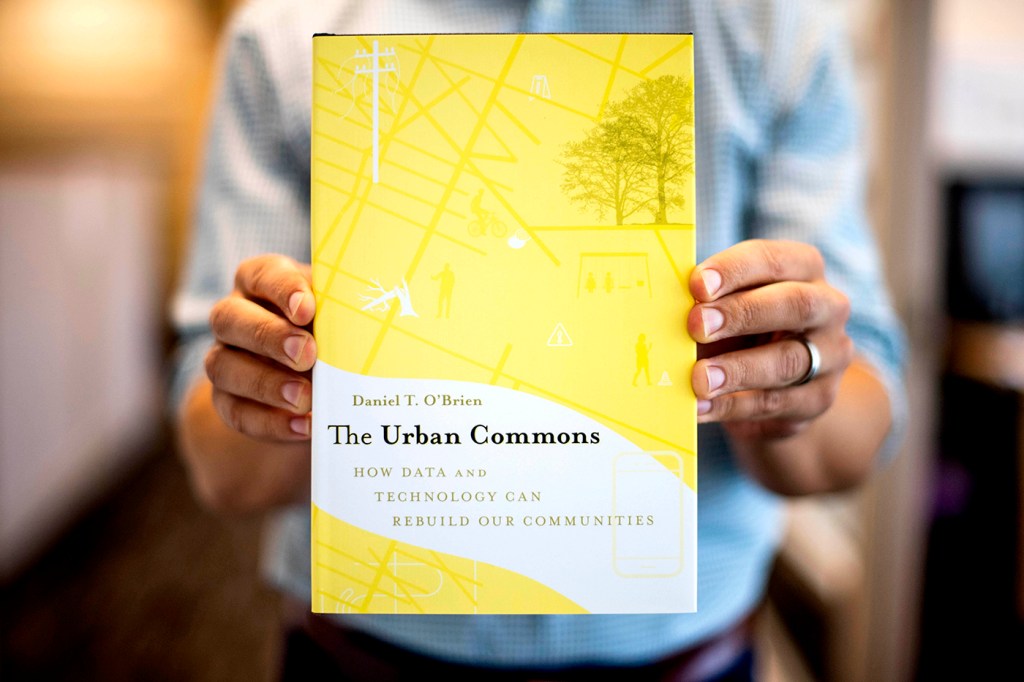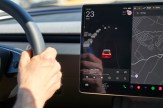What the 311 system can tell us about the future of smart cities

Only a few decades ago, when you’d hit a pothole or spotted a broken street light, you’d have to know somebody who knew somebody in the public works department in order to get it fixed.
The process of reporting and addressing these issues tended to be ad-hoc, disorganized, and arguably un-democratic, says Northeastern professor Dan O’Brien.
Then in 1996, Baltimore, Maryland implemented a system that enabled residents to report problems that didn’t require immediate attention directly to their local government. The program, called 311, unclogged the city’s emergency lines, and soon hundreds of other cities and towns had followed suit with their own 311 programs.

Dan O’Brien, an associate professor of public policy and urban affairs and criminology and criminal justice. Photo by Adam Glanzman/Northeastern University
The 311 system allows callers to report graffiti, litter, and vandalism—or amid the recent opioid epidemic, needle disposals—via phone, mobile app, website, or Twitter.
“Originally it didn’t have any purpose of its own except to not get in the way of an emergency system,” says O’Brien, who is an associate professor of public policy and urban affairs and criminology and criminal justice. “It was actually a really efficient way to organize public works inspections and really to manage services that were needed by communities.”
O’Brien, who describes the 311 system as a “new window into a social phenomenon,” says that the system became a game-changer for how Americans have maintained their public spaces.
“It democratizes the process,” he says. “It makes it more collaborative between the public and the government, and it also makes it more efficient.”
Boston’s 311 reporting system is the subject of O’Brien’s latest book, The Urban Commons: How Data and Technology Can Rebuild Our Communities. The culmination of five years of research conducted in collaboration with the Boston Area Research Initiative, O’Brien’s book recounts the history and evolution of 311 and reveals insights he gleaned from analyzing Boston’s 311 database of complaints.
O’Brien was recognized by the American Political Science Association in August earning its Dennis Judd Best Book Award for writing the best book on urban politics in 2018.
O’Brien set out to understand what motivates people to use the system, surmising that a person’s inclination for doing so stems from a sense of civic duty. But he discovered that wasn’t exactly right.
Nearly 80 percent of the reports came from people who were within two blocks of their home, he says. The callers weren’t people who were necessarily more likely to vote, volunteer, or write a letter to the editor; they were people who said they cared about their neighborhoods, who believed that 311 allowed them to help improve their communities in a more efficient manner.
“It turns out to be a little bit more what we would call ‘territoriality’—not in a bad way, but in the sense of ‘I care about the space; I feel some sense of ownership over it, either on my own or in conjunction with my neighbors, and I’m going to take action,’” says O’Brien.
Local governments benefit from this collaboration, too. By having residents act as the eyes and ears of their own communities, O’Brien suggests that local leaders can analyze data that has been crowdsourced in order to understand what their constituencies need, how to forecast for those needs, and improve urban life.
In a way, says O’Brien, 311 represents the “mundane version of smart cities.”
“It doesn’t have to be all sensors and autonomous vehicles,” he says. “Apps and basic digital data can help us understand and serve cities better. This is what the future of cities can look like.”
O’Brien became interested in the 311 system in 2011 after he helped launch the Boston Area Research Initiative, which is based at Northeastern’s School of Public Policy and Urban Affairs. At the time, the center, which O’Brien now directs, was looking to undertake a collaborative research and policy project focused on data and technology in Boston. The city’s 311 system was “calling for an evaluation,” says O’Brien.
“It was generating fantastic data and it was also generating data of a type that we’d never seen before,” he says. “We never really had access to information about how people take care of the city—what I’ve termed ‘custodianship in the urban commons.’”
O’Brien’s research on the 311 system isn’t yet complete; he’s now exploring to what extent the 311 system is supporting underserved communities, and whether those communities are being left behind.
“[A collaborative relationship] depends on the assumption that people in every neighborhood are going to pick up the phone or pull up the app and report something,” he says. “And what we find in the book is that’s simply not true.”
For media inquiries, please contact media@northeastern.edu.





